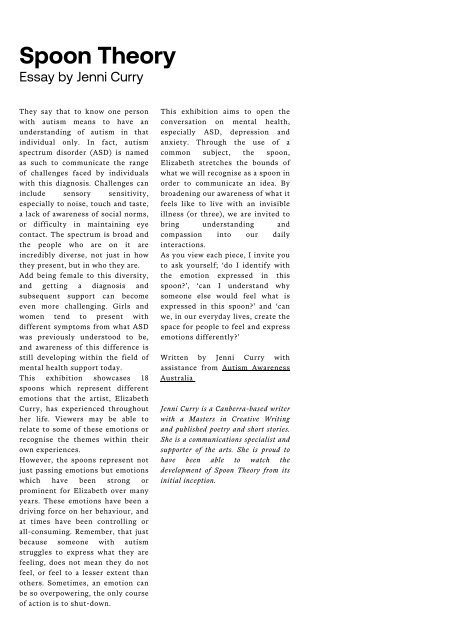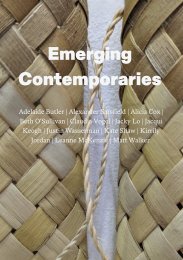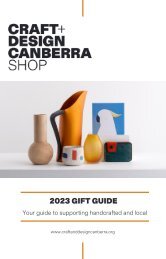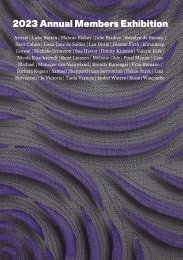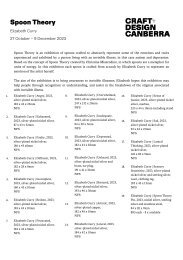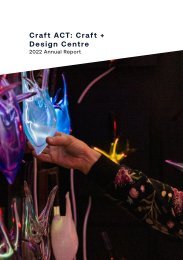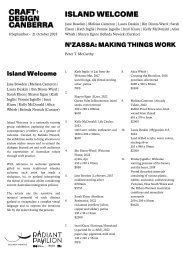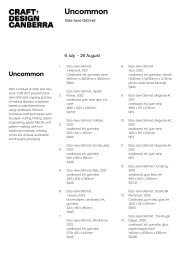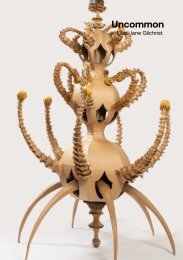Spoon Theory Exhibition Catalogue
Spoon Theory’ is an exhibition of spoons crafted to abstractly represent some of the emotions and traits experienced and exhibited by a person living with an invisible illness, in this case autism and depression. Based on the concept of Spoon Theory created by Christine Miserandino, each spoon will be crafted from scratch and represent an emotion or trait faced by a specific individual, the artist herself. The aim of the exhibition is to bring awareness to invisible illnesses. It is hoped that it may help some people either through recognition or understanding and assist in the breakdown of associated stigmas. By Elizabeth Curry
Spoon Theory’ is an exhibition of spoons crafted to abstractly represent some of the emotions and traits experienced and exhibited by a person living with an invisible illness, in this case autism and depression. Based on the concept of Spoon Theory created by Christine Miserandino, each spoon will be crafted from scratch and represent an emotion or trait faced by a specific individual, the artist herself.
The aim of the exhibition is to bring awareness to invisible illnesses. It is hoped that it may help some people either through recognition or understanding and assist in the breakdown of associated stigmas.
By Elizabeth Curry
You also want an ePaper? Increase the reach of your titles
YUMPU automatically turns print PDFs into web optimized ePapers that Google loves.
<strong>Spoon</strong> <strong>Theory</strong><br />
Essay by Jenni Curry<br />
They say that to know one person<br />
with autism means to have an<br />
understanding of autism in that<br />
individual only. In fact, autism<br />
spectrum disorder (ASD) is named<br />
as such to communicate the range<br />
of challenges faced by individuals<br />
with this diagnosis. Challenges can<br />
include sensory sensitivity,<br />
especially to noise, touch and taste,<br />
a lack of awareness of social norms,<br />
or difficulty in maintaining eye<br />
contact. The spectrum is broad and<br />
the people who are on it are<br />
incredibly diverse, not just in how<br />
they present, but in who they are.<br />
Add being female to this diversity,<br />
and getting a diagnosis and<br />
subsequent support can become<br />
even more challenging. Girls and<br />
women tend to present with<br />
different symptoms from what ASD<br />
was previously understood to be,<br />
and awareness of this difference is<br />
still developing within the field of<br />
mental health support today.<br />
This exhibition showcases 18<br />
spoons which represent different<br />
emotions that the artist, Elizabeth<br />
Curry, has experienced throughout<br />
her life. Viewers may be able to<br />
relate to some of these emotions or<br />
recognise the themes within their<br />
own experiences.<br />
However, the spoons represent not<br />
just passing emotions but emotions<br />
which have been strong or<br />
prominent for Elizabeth over many<br />
years. These emotions have been a<br />
driving force on her behaviour, and<br />
at times have been controlling or<br />
all-consuming. Remember, that just<br />
because someone with autism<br />
struggles to express what they are<br />
feeling, does not mean they do not<br />
feel, or feel to a lesser extent than<br />
others. Sometimes, an emotion can<br />
be so overpowering, the only course<br />
of action is to shut-down.<br />
This exhibition aims to open the<br />
conversation on mental health,<br />
especially ASD, depression and<br />
anxiety. Through the use of a<br />
common subject, the spoon,<br />
Elizabeth stretches the bounds of<br />
what we will recognise as a spoon in<br />
order to communicate an idea. By<br />
broadening our awareness of what it<br />
feels like to live with an invisible<br />
illness (or three), we are invited to<br />
bring understanding and<br />
compassion into our daily<br />
interactions.<br />
As you view each piece, I invite you<br />
to ask yourself; ‘do I identify with<br />
the emotion expressed in this<br />
spoon?’, ‘can I understand why<br />
someone else would feel what is<br />
expressed in this spoon?’ and ‘can<br />
we, in our everyday lives, create the<br />
space for people to feel and express<br />
emotions differently?’<br />
Written by Jenni Curry with<br />
assistance from Autism Awareness<br />
Australia<br />
Jenni Curry is a Canberra-based writer<br />
with a Masters in Creative Writing<br />
and published poetry and short stories.<br />
She is a communications specialist and<br />
supporter of the arts. She is proud to<br />
have been able to watch the<br />
development of <strong>Spoon</strong> <strong>Theory</strong> from its<br />
initial inception.


